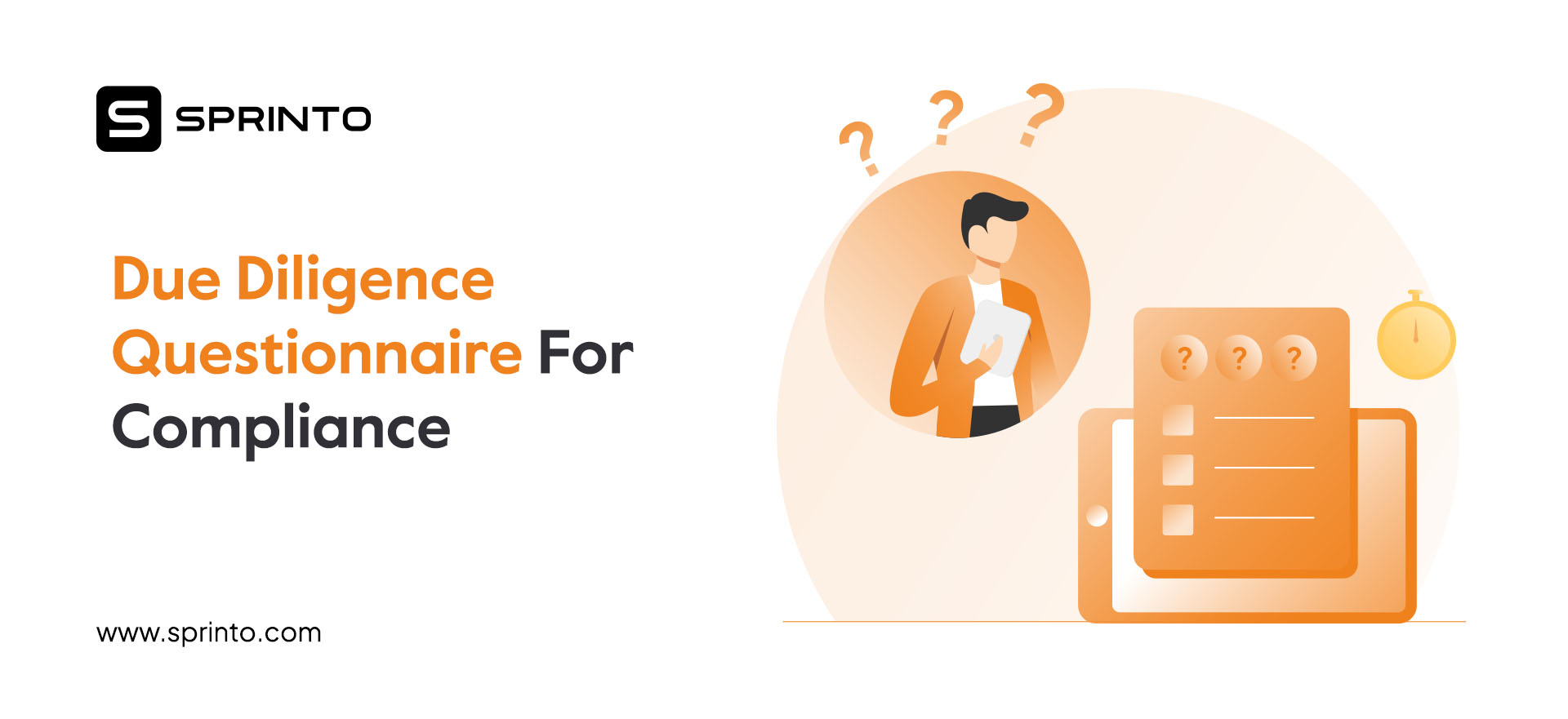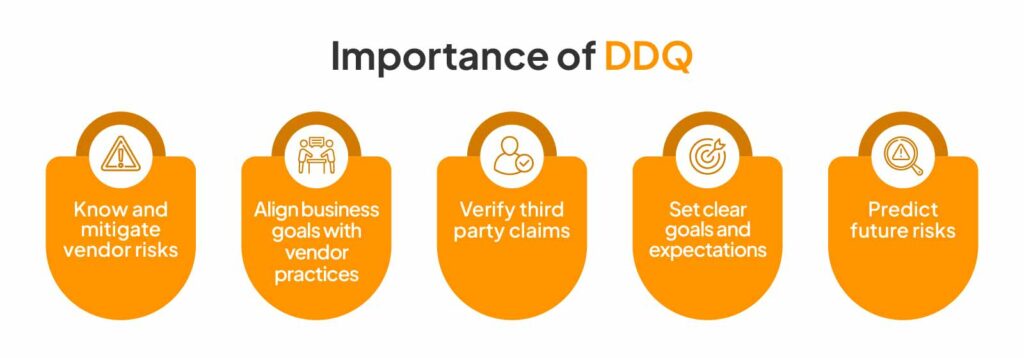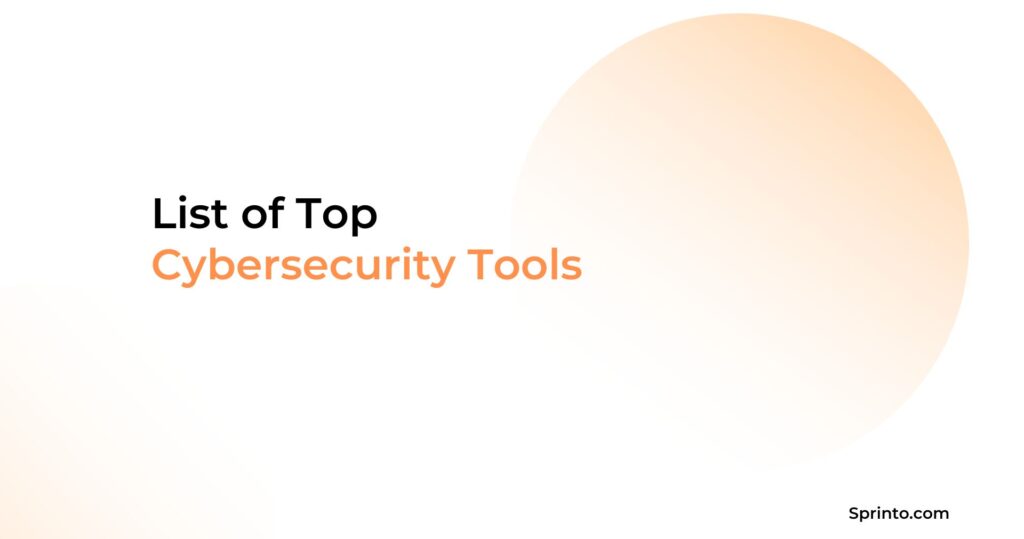Due Diligence Questionnaire: Key Insights, Best Practices, and Examples for Compliance

Business growth is a loaded term that involves a lot more complexities underneath the revenue boost and brand visibility. Small to medium firms often delegate tasks to external resources to save time, and money, and boost growth opportunities.
However, this comes at a cost-sharing sensitive data adds unprecedented risks. But thanks to the due diligence questionnaire, it is possible to mitigate these risks.
In this article, we help you understand what due diligence is in compliance, and what it includes, and illustrate a few examples of DDQ.
What is due diligence in compliance?
Vendor due diligence is the process of assessing a service provider’s security controls, relevant experience, and operational stability. It is a crucial step in filtering out third-party services with inadequate or ineffective security practices, policies, and controls.
Some key metrics used to evaluate potential vendors include security certifications from authorized bodies, their understanding of applicable regulations, and feedback from real customers.
What is a due diligence questionnaire (DDQ)?
A due diligence questionnaire, or DDQ, is a list of questions that are designed to evaluate various aspects of cybersecurity standards implemented in your organization before a major investment, merger, or acquisition.
What should a due diligence questionnaire cover?
A due diligence questionnaire (DDQ) can cover key areas for assessing risks, such as regulatory and compliance status, security policies, data protection measures, third-party relationships, servers, and the company’s legal status.
Here’s a list of aspects to cover in the Due Diligence Questionnaire:
- Security policies and governance—This includes the policies set by organizations that dictate SLAs, culture, controls, and mitigation efforts for data security.
- Data Protection & Privacy – This includes vetting how a company handles sensitive customer information with practices like encryption, access controls, and compliance with GDPR, CCPA, or HIPAA.
- Access Management—Access management prevents unauthorized access to data and systems, thus playing a pivotal role in maintaining data confidentiality and integrity. Controls such as MFA access controls and least privilege enforcement help with this.
- Compliance & certifications – Adherence to SOC 2, ISO 27001, NIST, CIS, or FedRAMP proves a robust security posture.
- Network & infrastructure security – These measures guard access or entry into a secure network. For example, firewalls, intrusion detection/prevention systems (IDS/IPS), endpoint protection, and patch management.
- Third-Party & Supply Chain Security – Vendor risk management processes, security audits of subcontractors, and third-party access policies.
- Compliance & certifications – Adherence to SOC 2, ISO 27001, NIST, CIS, or FedRAMP proves a robust security posture.
How does due diligence questionnaire help organizations?
Due diligence questionnaire is a crucial process for vendor selection. It offers numerous benefits that include:

Risk mitigation
A good DDQ aids in risk mitigation by helping your business assess and thoroughly understand the potential risks you must address before signing the contract for investment or acquisition.
During the acquisition or merger, you never know what kind of data the new company you’re trying to acquire is dealing with.
A good due diligence process will help you identify and evaluate risks in categories like regulatory compliance, cybersecurity, business partnerships, etc.
Mergers and acquisitions
Industry experts accept the questionnaire as a necessary requirement that helps buyers evaluate assets, liabilities, and risk processes before a potential merger or acquisition. It allows them to gather essential information and decide whether to proceed with the deal.
New investments
DDQs are a gold mine for investors to evaluate the strength of an investment they are looking to close. But remember, it’s an initial step in due diligence, not the final one. Investors use the answers to guide further questions and discussions with managers and verify information from other sources.
Collecting helpful data
Do you have insight into your potential acquisition target’s safety measures and operational practices? If not, a DDQ can be immensely beneficial.
It facilitates the acquisition of valuable information during the disclosure process, clarifying various aspects of the target company’s operations and practices. Through the DDQ, you can gather essential data to speed up decision-making and mitigate regulatory compliance risks.
Also read: How to manage compliance risk
Why do organizations issue DDQ?
Organizations issue Due Diligence Questionnaires (DDQs) to ensure trust and vet security posture before entering business relationships. These questionnaires help evaluate a vendor’s, partner’s, or acquisition target’s security, compliance, financial stability, and operational integrity. In cybersecurity, DDQs are critical for verifying that third parties follow industry regulations like SOC 2, ISO 27001, or GDPR, reducing the risk of data breaches or compliance violations. Partnering with non-compliant vendors or organizations can also cost companies their own compliance and invite fines.
What does a vendor due diligence questionnaire include?
Vendor due diligence questionnaire process includes reviewing policies and components that can affect your business growth such as company records, audit feedback, financial data, and certifications. Consider assessing the following factors:
1. Proof of legitimacy
Every service provider tries to show themselves as the best in the industry. This makes your investigation harder – especially if the vendor is a new player in the market. Try to gather data on their listings, certifications from the right bodies, history of conducting business, operational structure, compliance knowledge, and other necessary protocols.
2. Risk assessment and business continuity
If your service requirement involves sharing sensitive information with third parties, a robust risk management process is mandatory. Potential vendors should have an effective system to manage end-to-end risk elimination capabilities. This includes categorizing risks based on their level of severity and strategically secure systems based on their importance.

3. Adherence to compliance
No matter the type of industry and size of business, government or industry-specific regulations to all organizations. When you partner with third-party vendors who handle your data, these laws extend to them by default. So ensure that the vendor due diligence questionnaire covers elements to understand the vendor’s familiarity with applicable legal requirements.
4. Security posture and measures
Security protocols to maintain the confidentiality, integrity and availability of data includes technical, physical, and administrative controls. Common measures include encryption, access control, two-factor authentication, antivirus software, data backup, firewall, and more. The system should be equipped to detect vulnerabilities, prevent threats from entering the system, remove risks once it has been infected, and have a strategy to recover from the disaster.
5. Resilience and recovery
Recovering from a crisis requires a clear understanding of your response and a clearly sketched-out recovery plan.
DDQs play a role in this by asking pertinent questions, such as how vendors handle crises and what response can be expected, including timelines. This helps ensure preparedness and effective crisis management.
6. Data security
Securing vendor data is an important category of questions that the DDQ covers. A good DDQs covers topics such as security measures vendors or target companies implement to protect sensitive data.
Also read: Guide to security posture
7. Network evaluation
Review the process and tools utilized by the vendor. A good practice is to check the level of visibility they have into the network, monitoring processes, reporting capabilities, and the strategy to operationalize network management system.
Types of due diligence questions
Different industries use different types of due diligence questions, but technology, government, and finance sectors have overlapping commonalities. The finance due diligence questionnaire is the most widespread version, but there are other variations as well.
Some of the different types are:
- Private equity due diligence
- Third-party due diligence
- Vendor due diligence
- IP due diligence
- Hedge fund due diligence
- Investment manager due diligence checklist
- Technical due diligence
- ESG due diligence
- Tax due diligence
- HR due diligence
- Legal due diligence
- Environmental due diligence
- Confirmatory due diligence
- Specialized due diligence
Here’s a list of categories of due diligence on which the questions are based on:
- Revenue and profitability
- Cash flow analysis
- Debt and liabilities
- Budgeting and forecasting
- Compliance with laws and regulations
- Pending litigation or legal disputes
- Intellectual property rights
- Contractual obligations
- Business processes and workflows
- Supply chain management
- Quality control and assurance
- Operational efficiency
- Market trends and dynamics
- Competitive landscape
- Customer demographics and preferences
- Industry challenges and opportunities
- Employee demographics and turnover rates
- Employment contracts and agreements
- HR policies and procedures
- Workplace culture and morale
- IT systems and infrastructure
- Data security measures
- Cybersecurity policies and protocols
- IT compliance with industry standards
- Environmental impact assessments
- Compliance with environmental regulations
- Sustainability initiatives and practices
- Environmental risks and liabilities
- Key business partnerships and alliances
- Customer and supplier relationships
- Vendor contracts and agreements
- Strategic alliances and joint ventures
- Insurance coverage and policies
- Risk management strategies
- Risk assessment and mitigation plans
- Coverage for potential liabilities
- Board composition and structure
- Corporate governance policies
- Ethical standards and practices
- Internal controls and compliance mechanisms
Examples of a successful due diligence questionnaire
Many organizations offer a pre-filled questionnaire template to streamline the process of onboarding new service providers. Some popular ones are listed below:
PRI hedge fund DDQ
Principles for Responsible Investing (PRI) helps investors understand, evaluate, and assess how hedge fund managers approach responsible investment. The questionnaire can be used during RPF processes, to review managers, or client meetings. It covers the following areas:
- Policy and governance
- Investment process
- Stewardship
- Reporting and verification
- Additional information
Limited partners DDQ
The Limited Partners’ (LP) Private Equity Responsible Investment Due Diligence Questionnaire (DDQ) is a part of the Institutional Limited Partners Association’s (ILPA) DDQ.
It helps investors evaluate and gain visibility into the processes a general partner (GP) uses to incorporate material environmental, social and governance (ESG) risks in their investment practices. It covers areas such as
- Policy
- Fundraising
- Pre-investment
- Post-investment
- Reporting & disclosure
- Climate change
- Additional information
Correspondent banking DDQ
Created by the Wolfsberg Group, this DDQ lists more than 100 questions for financial investors who engage in cross border or high risk correspondent banking. The Wolfsberg Group recommends using it for new and existing customers as part of their periodic reviews. It reduces costs, improves financial crime compliance, adds efficiency to know-your-customer (KYC) utilities, and mitigates decline in correspondent banking.
MISC business relationship DDQ
Malaysia International Shipping Corporation business relationship DDQ is a moral questionnaire that seeks to prevent bribery and corruption. It also aims to minimize risk exposure as a part of activities that MISC conducts on behalf of their clients.
IPO due diligence checklist
Initial Public Offering DDQ ensures that companies meet the necessary requirements before going public. It assesses the financial, legal, operational, regulatory, and structural issues. It covers the following areas:
- Organizational Data
- Licensing and Taxation
- Board and Employee Information
- Financial Information
- Customer/Service Information
- Company Property
Gain in-depth risk assessment insights with Sprinto
Vendor risk assessment is a crucial aspect of security compliance. Effective vetting and management helps to assess and monitor their compliance.
The Sprinto solution empowers you to track vendors based on the type of data shared with them and the selected compliance framework. Add any number of vendors, create assessments, calculate risk profile based on level of threat, and edit the auto calculated risks. Additionally, you can upload multiple due diligence for every assessment, edit assessment, and triage the risk profiles. Get a free demo today!
FAQs
What are the 4 Ps of due diligence?
The 4 P’s of due diligence are:
People: assesses the experience and expertise of those managing the portfolio.
Philosophy: focuses on whether the plan makes sense and is likely to generate a high return on investment.
Process: assesses how well the plan is implemented and managed.
Performance: analyzes how well strategies work in the long term.
What is the due diligence questionnaire for security?
A due diligence questionnaire for security assesses the security controls and relevant experience a service provider has before partnering with them.
What is a vendor due diligence questionnaire?
A vendor due diligence questionnaire is an evaluation factor to gain a comprehensive understanding of the vendor’s security posture and practices. It helps organizations to make an informed decision and avoid buyer’s remorse.
Anwita
Anwita is a cybersecurity enthusiast and veteran blogger all rolled into one. Her love for everything cybersecurity started her journey into the world compliance. With multiple certifications on cybersecurity under her belt, she aims to simplify complex security related topics for all audiences. She loves to read nonfiction, listen to progressive rock, and watches sitcoms on the weekends.
Explore more
research & insights curated to help you earn a seat at the table.




















